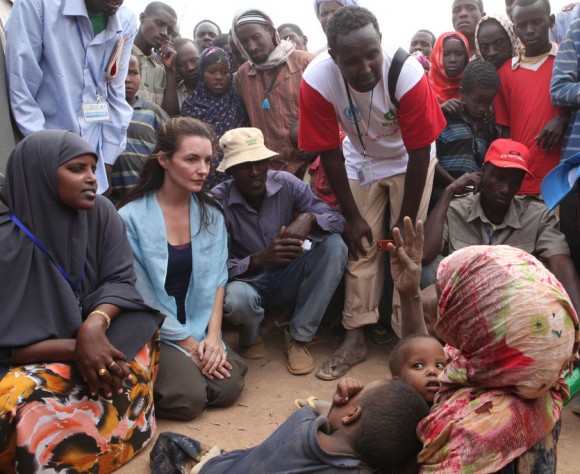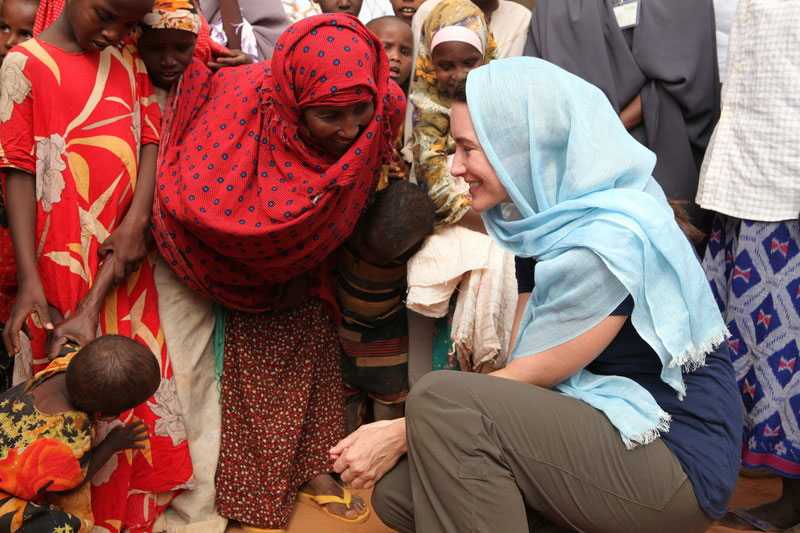I was unprepared for what I saw at the Dadaab camp in Kenya. Totally unprepared for the utter sense of panic in the people I met there. These were the newcomers, people who could not fit into the largest refugee camp in the world. Because they could not fit, they were left outside in the nothingness that surrounds the camp. Their unbelievably difficult journey towards food, water, and shelter had led them to none of those things.

They were panicked because many had lost children during the journey to Dadaab, and many children were dying on arrival. Past the point where food and water could bring them back to life. They were panicked because hyenas circle the area every night looking for the weakest of the children. The women I met are mostly alone, trying to protect babies and small children by themselves with nothing but thorny twigs. Most of these women have collected "unaccompanied minors" along their journey to the camp. These children are no relation to the women who now try to keep them alive. They are probably orphans. But that will take some time to sort out.
In the meantime, kind women who have been robbed of their every possession, including their clothes, are extending their warm embrace to sometimes seven extra orphans. These women's faces haunt me. Their strength and determination inspire me. I am filled with wonder at how they are finding their strength. I asked them to tell me their stories so that I could tell the world what is happening to them, but I fear that I will never be able to do enough for them.

I still cannot believe that this is happening in the year 2011. These people are the victims of a perfect storm of problems, coming together to create a crisis. In some parts of Somalia it has not rained in six years. The price of sorghum (a staple for them) has soared 240%. Maize has risen 40%. Conflict has plagued their nation for so long that it seems to have become a sad way of life. There are no simple answers for these problems. Many smart minds all over the world have been working on these issues for years. And in some cases there has been great success. In 2010 I visited northern Ethiopia with Oxfam and found inspiring long-term projects targeting food security.
Yet somehow we are not fully prepared for situations like that happening in the Horn of Africa. I am heartened by the generosity shown by the public in these tough economic times. I am also so impressed with the Disasters Emergency Committee (DEC), the committee of NGOs gathered together in the UK to help. This is what we need to combat humanitarian crises such as this. We need the walls that separate people and groups to fall down, so that we are all together to help.
We need long-term support of projects that bring change – projects that give the people in the world who are marginalised their own tools for food security, so that they are not dependent on aid. In all of my many trips with Oxfam I have never met anyone who wants a handout. I have met people who want to work hard to support their families. They may need a hand in making that happen, but then they would like to do it themselves. Just as all of us would.
That is what is so tragic about the estimated 9,000 new people pouring into Dadaab weekly. How horrible must their situation at home have been that they would travel a perilous journey to this barren camp? I feel strongly that we must help these woman and children with the basics of life – water, food, shelter. We must let them know that the world does care. They are not forgotten.
UK aid is providing emergency assistance for more than two million people across the Horn of Africa, including 130,000 refugees in Dadaab. Get the latest updates on the British Government's response at www.dfid.gov.uk/eastafricafoodcrisis
Please note, this is a guest blog. Views expressed here do not necessarily represent the views of DFID or have the support of the British Government.

3 comments
Comment by The biggest crime of News International | There goes rhymin Simon posted on
[...] Women, already robbed, starving, violated and deeply traumatised, are protecting their desperately weak babies from snarling hyenas, armed only with thorny twigs. [...]
Comment by alvira iljas posted on
Why people spent their billion of dollars for creating wars instead of helping these refugees >>>
Comment by Christine Gibbard posted on
This was a very moving account but also gav some encouragement about the efforts of support reaching the starving. I am a volunteer working in a poor community near Runyenjes Embu. I have been in touch with CCS Christian Community Services based at the Diocesan hub at Kerugoya. Theyare also going in with water tanks water trucks and food vouchers. In the last few days some frienda and a small boy ( who sold his toys and clothes to raise £50) have sent us just over £1000 and I am planning to collect maize beans salt sugar from donations from the people on our road and from local churches. Then I will travel to the border on a hired truck with the cooperation of CCS. It is about time that the Kenyans help Kenyans . There is a great supply of food here despite the lack of cash in hand. Let's hope for that long term plan to include Kenya aid aso.